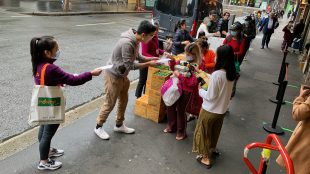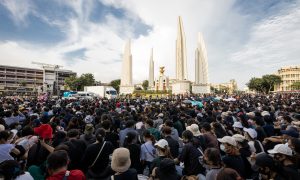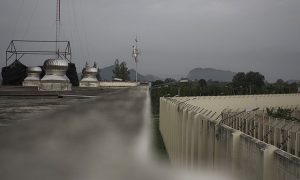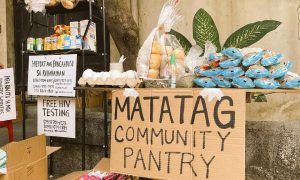Thailand’s experience with the COVID-19 pandemic presents a useful case for students and practitioners of politics and public services management to analyse how we have arrived at the predicaments we are now facing. Early in the pandemic, Thailand was seen as having one of the most successful responses to the pandemic in the world. Moreover, the country has a proven record of achievement in population and public health development. Now, however, the country has been facing a massive COVID-19 surge for several months, and the health system is under enormous strain.
Soon after the first COVID-19 outbreak hit Thailand in January 2020, Prime Minister Prayut Chan-o-cha established the Centre for COVID-19 Situation Administration (CCSA), headed by the Prime Minister himself. Formed in March 2020, initially, the centre did only what it was supposed to do, i.e., disseminated information to citizens through multiple channels and raised awareness of the dangers posed by the virus and the methods people should use to protect themselves. The responsibility, authority and decision-making power of managing the overall COVID response was delegated to provincial authorities such as governors (who also headed the provincial communicable disease committees), local government organisations, local business leaders and citizen volunteers. They all worked and cooperated as de facto local leaders in Thailand’s initially highly effective response to the pandemic.
Historically, the success of public health services in Thailand is attributed to a decentralized management approach. However, after the early phases of the pandemic, the central government concentrated the power of issuing directives pertaining to measures regarding COVID solely to the CCSA, centralising the country’s entire antivirus program and overriding the decision power of even the Ministry of Public Health. To make matters worse, the CCSA has often issued what seem to be more like public relations statements in reaction to the latest crisis, rather than policies in anticipation of the next. This has weakened Thailand’s ability to respond effectively, and the number of deaths and new infections have risen to new extremes.
During the pandemic, “immodest” or ungrateful receiving by the poor has been strongly denounced both by the state and middle-class donors.
Moral economies: the politics of donation in Thailand under COVID-19
In April 2021, as the third wave of the pandemic hit, the cabinet granted Prime Minister Prayut Chan-O-Cha sweeping powers over the management of the pandemic. Since then, the government has come been criticised for limiting vaccinations to Sinovac and AstraZeneca and faced demands to reveal the details of the contracts between the government and vaccine suppliers of the vaccines. In response, the government first attempted to pacify the public by releasing an unofficial message that it had also approved the Pfizer and Moderna vaccines, but anticipated difficulty in securing these vaccines due to surges in worldwide demand. Recently, we have seen more confusion with the announcement that there will be a policy of mixing Sinovac and AstraZeneca jabs despite the WHO’s concerns over the lack of trials of such a mixed approach.
Citizen trust in Thailand’s political system has been seriously affected by the problems in the handling of the pandemic. This specifically pertains to the CCSA, which is headed by the Prime Minister and comprised almost exclusively of ministers and heads of departmental level bureaucratic agency. They all must act properly to redeem public faith.
They also should not be pretending that what they are doing and how they are doing it can lead the country out of the disaster just by virtue of their saying it is so. They need to be honest with citizens and they must realise that they are not superhuman.
They must also be cognisant of the importance of delegating responsibility, authority, and decision-making power to all stakeholders. They must create synergies between society, economy, and democracy. As noted earlier, Thailand was quite successful during the first wave of the COVID-19 pandemic when the national government essentially left the response to the local and provincial levels and took more of a facilitating role, supporting these local efforts. It should be left to provincial governors to work with local authorities to develop a strategy that works for their areas.
In addition, they should understand, appreciate, and foster positive relationships with, and shared values of, different actors for the common goal of dealing with the physical, psychological, spiritual, and economic wellbeing of the citizens. The CCSA must rely on scientific facts and research findings in formulating their policy guidelines, which has not been apparent in the past. This will justify their decisions and remove politics from the equation, at least as far as that is possible in Thailand.
The CCSA must be courageous enough to experiment or embrace new ways of operating while basing these policies on accepted research and scientific findings. They must recognise that there are a wider variety of vaccines that should be offered to the people and make a serious effort to acquire enough of these vaccines and to distribute them fairly. It is time to stop serving the patrons who put them in power and start attending to the betterment of all the citizens of Thailand. It is time to be responsive to the needs of the constituents and be true leaders rather than run-of-the-mill politicians. It is time to give up being in control and to return autonomy to the local administrative organizations to deal with the pandemic as they have proven they can. Support them and get out of their way.
 Facebook
Facebook  Twitter
Twitter  Soundcloud
Soundcloud  Youtube
Youtube  Rss
Rss 



